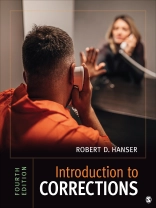Introduction to Corrections provides students with a comprehensive foundation of corrections that is practitioner-driven and grounded in modern research and theoretical origins. Experienced correctional practitioner, scholar, and author Robert D. Hanser shows students how the corrections system works, from classification, security, and treatment, to demonstrating how and why correctional practices are implemented. The
Fourth Edition includes a special emphasis on the role of technology in each chapter; new topics on medical care in jail, female drug offenders, and controversies around the death penalty; and the impact of the COVID-19 pandemic on correctional practices. Data and examples drawn from federal government documents, along with exercises that reinforce concepts in the text, further aid student learning.
Innehållsförteckning
PART I: FOUNDATIONS OF CORRECTIONS
Chapter 1: Early History of Punishment and the Development of Prisons in the United States
Chapter 2: Ideological and Theoretical Underpinnings to Sentencing and Correctional Policy
Chapter 3: Correctional Law and Legal Liabilities
PART II: CORRECTIONAL PRACTICES
Chapter 4: Jail and Detention Facilities
Chapter 5: Probation
Chapter 6: Intermediate Sanctions
Chapter 7: Facility Design to Meet Security and Programming Needs
Chapter 8: Classification and Custody Levels
Chapter 9: Prison Subculture and Prison Gang Influence
Chapter 10: Immigration Detention Centers
Chapter 11: Female Offenders in Correctional Systems
Chapter 12: Specialized Inmate Populations
Chapter 13: Juvenile Correctional Systems
Chapter 14: Correctional Administration
Chapter 15: Prison Programming
Chapter 16: Parole, Reentry, and Case Management
PART III: ISSUES AND TRENDS IN CORRECTIONS
Chapter 17: The Death Penalty
Chapter 18: Program Evaluation, Evidence- Based Practices, and Future Trends in Corrections
Glossary
References
Index
Om författaren
Robert D. Hanser is a professor of criminal justice and the coordinator of the Department of Criminal Justice at the University of Louisiana at Monroe. Dr. Hanser has a Ph D in marriage and family therapy and a Ph D in criminal justice. He also has graduate degrees in psychology (psychometrics emphasis), counseling, social work, and substance abuse administration. He is a national certified counselor, a licensed professional counselor in the states of Louisiana and Texas, a licensed addiction counselor, a certified hypnotherapist, and a certified anger management therapist. Dr. Hanser worked as a correctional officer at Eastham State Prison, in Texas, for several years. He has gained extensive practitioner experience in treatment programming in Louisiana at Richwood Correctional Center (RCC), Madison Parish Correctional Center (MPCC) and the Louisiana Transitional Center for Women (LTCW). He has expertise in therapeutic programming, mental health response, education within correctional facilities, substance use disorder treatment, and reentry. He holds a gubernatorial appointment on the Reentry Advisory Council of Louisiana, serves on the Board of Directors of the Louisiana Coalition Against Domestic Violence (LCADV), has been appointed to the Professional Educational Counsel with the American Correctional Association (ACA), and is an Executive Counselor for the Corrections section for the Academy of Criminal Justice Sciences (ACJS). He is a past member of the 4th Judicial District’s Youth Services Planning Board, a past therapeutic director of the 4th Judicial District Drug Court, and is the lead therapist for the 4th Judicial District Reentry Court and the 4th Judicial District Batterer’s Intervention Program. Dr. Hanser is also a site surveyor for the Commission on Accreditation of Rehabilitation Facilities (CARF). He has aided several organizations in obtaining and/or maintaining CARF accreditation throughout his career, with expertise in substance use and behavioral health treatment programming. He has written Introduction to Corrections (3rd Ed.), Community Corrections (2nd Ed.), Juvenile Justice (10th Ed.), Correctional Counseling, Multiculturalism in the Criminal Justice System, Special Needs Offenders, and over 60 other publications, including textbooks, anthology chapters, and peer reviewed articles.












